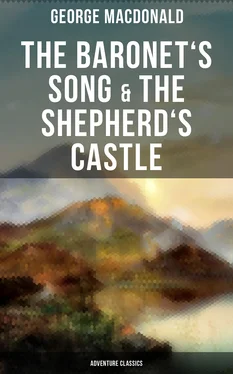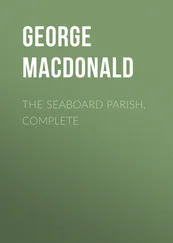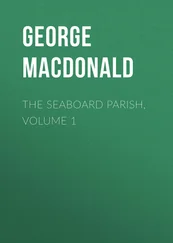"What's yer wull?" she said indifferently.
Mr. Sclater made no answer, waiting for her to turn and face him, which she did the sooner for his silence. Then she saw a man unknown to her, evidently, from his white neckcloth and funereal garments, a minister, standing solemn, with wide-spread legs, and round eyes of displeasure, expecting her attention.
"What's yer wull, sir?" she repeated, with more respect, but less cordiality than at first.
"If you ask my will," he replied, with some pomposity, for who that has just gained an object of ambition can be humble?—"it is that you shut up this whisky shop, and betake yourself to a more decent way of life in my parish."
"My certie! but ye're no blate (over-modest) to craw sae lood i' my hoose, an' that's a nearer fit nor a perris!" she cried, flaring up in wrath both at the nature and rudeness of the address. "Alloo me to tell ye, sir, ye're the first 'at ever daured threep my hoose was no a dacent ane."
"I said nothing about your house. It was your shop I spoke of," said the minister, not guiltless of subterfuge.
"An' what's my chop but my hoose? Haith! my hoose wad be o' fell sma' consideration wantin' the chop. Tak ye heed o' beirin' fause witness, sir."
"I said nothing, and know nothing, against yours more than any other shop for the sale of drink in my parish."
"The Lord's my shepherd! Wad ye even (compare) my hoose to Jock Thamson's or Jeemie Deuk's, baith i' this perris?"
"My good woman,—"
"Naither better nor waur nor my neepers," interrupted Mistress Croale, forgetting what she had just implied: "a body maun live."
"There are limits even to that most generally accepted of all principles," returned Mr. Sclater; "and I give you fair warning that I mean to do what I can to shut up all such houses as yours in my parish. I tell you of it, not from the least hope that you will anticipate me by closing, but merely that no one may say I did anything in an underhand fashion."
The calmness with which he uttered the threat alarmed Mistress Croale. He might rouse unmerited suspicion, and cause her much trouble by vexatious complaint, even to the peril of her license. She must take heed, and not irritate her enemy. Instantly, therefore, she changed her tone to one of expostulation.
"It's a sair peety, doobtless," she said, "'at there sud be sae mony drouthie thrapples i' the kingdom, sir; but drouth maun drink, an' ye ken, sir, gien it war hauden frae them, they wad but see deils an' cut their throts."
"They're like to see deils ony gait er' lang," retorted the minister, relapsing into the vernacular for a moment.
"Ow, deed maybe, sir! but e'en the deils themsels war justifeed i' their objection to bein' committed to their ain company afore their time."
Mr. Sclater could not help smiling at the woman's readiness, and that was a point gained by her. An acquaintance with Scripture goes far with a Scotch ecclesiastic. Besides, the man had a redeeming sense of humour, though he did not know how to prize it, not believing it a gift of God.
"It's true, my woman," he answered. "Ay! it said something for them, deils 'at they war, 'at they preferred the swine. But even the swine cudna bide them!"
Encouraged by the condescension of the remark, but disinclined to follow the path of reflection it indicated, Mistress Croale ventured a little farther upon her own.
"Ye see, sir," she said, "as lang's there's whusky, it wull tak the throt-ro'd. It's the naitral w'y o' 't, ye see, to rin doon, an' it's no mainner o' use gangin' again natur. Sae, allooin' the thing maun be, ye'll hae till alloo likewise, an' it's a trouth I'm tellin' ye, sir, 'at it's o' nae sma' consequence to the toon 'at the drucken craturs sud fill themsels wi' dacency—an' that's what I see till. Gang na to the magistrate, sir; but as sune's ye hae gotten testimony—guid testimony though, sir—'at there's been disorder or immorawlity i' my hoose, come ye to me, an' I'll gie ye my han' to paper on't this meenute, 'at I'll gie up my chop, an' lea' yer perris—an' may ye sune get a better i' my place. Sir, I'm like a mither to the puir bodies! An' gin ye drive them to Jock Thamson's, or Jeemie Deuk's, it'll be just like—savin' the word, I dinna inten' 't for sweirin', guid kens!—I say it'll just be dammin' them afore their time, like the puir deils. Hech! but it'll come sune eneuch, an' they're muckle to be peetied!"
"And when those victims of your vile ministrations," said the clergyman, again mounting his wooden horse, and setting it rocking, "find themselves where there will be no whisky to refresh them, where do you think you will be, Mistress Croale?"
"Whaur the Lord wulls," answered the woman. "Whaur that may be, I confess I'm whiles laith to think. Only gien I was you, Maister Sclater, I wad think twise afore I made ill waur."
"But hear me, Mistress Croale: it's not your besotted customers only I have to care for. Your soul is as precious in my sight as any of which I shall have to render an account."
"As Mistress Bonniman's, for enstance?" suggested Mrs. Croale, interrogatively, and with just the least trace of pawkiness in the tone.
The city, large as it was, was yet not large enough to prevent a portion of the private affairs of individuals from coming to be treated as public property, and Mrs. Bonniman was a handsome and rich young widow, the rumour of whose acceptableness to Mr. Sclater had reached Mistress Croale's ear before ever she had seen the minister himself. An unmistakable shadow of confusion crossed his countenance; whereupon with consideration both for herself and him, the woman made haste to go on, as if she had but chosen her instance at merest random.
"Na, na, sir! what my sowl may be in the eyes o' my Maker, I hae ill tellin'," she said, "but dinna ye threip upo' me 'at it's o' the same vailue i' your eyes as the sowl o' sic a fine bonny, winsome leddy as yon. In trouth," she added, and shook her head mournfully, "I haena had sae mony preevileeges; an' maybe it'll be seen till, an' me passed ower a wheen easier nor some fowk."
"I wouldn't have you build too much upon that, Mistress Croale," said Mr. Sclater, glad to follow the talk down another turning, but considerably more afraid of rousing the woman than he had been before.
The remark drove her behind the categorical stockade of her religious merits.
"I pey my w'y," she said, with modest firmness. "I put my penny, and whiles my saxpence, intil the plate at the door when I gang to the kirk—an' I was jist thinkin' I wad win there the morn's nicht at farest, whan I turnt an' saw ye stan'in there, sir; an' little I thoucht—but that's neither here nor there, I'm thinkin'. I tell as feow lees as I can; I never sweir, nor tak the name o' the Lord in vain, anger me 'at likes; I sell naething but the best whusky; I never hae but broth to my denner upo' the Lord's day, an' broth canna brak the Sawbath, simmerin' awa' upo' the bar o' the grate, an' haudin' no lass frae the kirk; I confess, gien ye wull be speirin', 'at I dinna read my buik sae aften as maybe I sud; but, 'deed, sir, tho' I says't 'at sud haud my tongue, ye hae waur folk i' yer perris nor Benjie Croale's widow; an' gien ye wunna hae a drap to weet yer ain whustle for the holy wark ye hae afore ye the morn's mornin', I maun gang an' mak my bed, for the lass is laid up wi' a bealt thoom, an' I maunna lat a' thing gang to dirt an' green bree; though I'm sure it's rale kin' o' ye to come to luik efter me, an' that's mair nor Maister Rennie, honest gentleman, ever did me the fawvour o', a' the time he ministered the perris. I haena an ill name wi' them 'at kens me, sir; that I can say wi' a clean conscience; an' ye may ken me weel gien ye wull. An' there's jist ae thing mair, sir: I gie ye my Bible-word, 'at never, gien I saw sign o' repentance or turnin' upo' ane o' them 'at pits their legs 'aneth my table—Wad ye luik intil the parlour, sir? No!—as I was sayin', never did I, sin' I keepit hoose, an' never wad I set mysel' to quench the smokin' flax; I wad hae no man's deith, sowl or body, lie at my door."
Читать дальше












